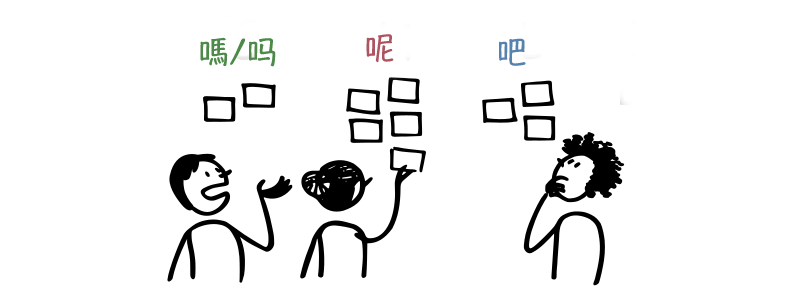Grammar Point:
Final Particles in Mandarin Chinese is a nightmare for most Chinese learners. In this article, we are going to learn the most common final particles in Chinese 吗 ma, 吧 ba, and 呢 ne.
Just in case, I provide audio files to help you know how we change intonations without changing any tones. Please make sure you’ve read the entire article before you listen to the file.
Final Particles 嗎/吗 ma
The question that you really don’t know the answer to
你是日本人嗎?你是日本人吗?
Are you Japanese?
你喜歡貓嗎?你喜欢猫吗?
Do you like cats?
Final Particles 吧 ba
Checking or confirmation: compare with 吗 ma, this one you already have some guessing in your mind.
你是日本人吧?你是日本人吧?
You are Japanese, right?
你喜歡貓吧?你喜欢猫吧?
You like cats, don’t you?
Suggestion
你學一點中文吧!你学一点儿中文吧!
You should learn some Chinese!
我們今天吃牛肉麵吧!我们今天吃牛肉面吧!
Let’s eat beef noodles today! (suggest)
Compromise (Using as a compromise you need to speak with a slight draw)
好吧…好吧…
Fine….( Implying that you have no choice but to say yes.)
那就吃牛肉麵吧…那就吃牛肉面吧…
Fine…then let’s have beef noodles.
Final Particles 呢 ne
Bounce back question (How about..? What about..?)
我是日本人,你呢?我是日本人,你呢?
I am Japanese, how about you?
你喜歡貓,他呢?你喜欢猫,他呢?
You like cats, how about him?
你今天很忙,明天呢?你今天很忙,明天呢?
You are busy today, how about tomorrow?
Where – Noun + 呢 ne
狗呢?狗呢?
Where’s the dog?
我的錢呢?我的钱呢?
Where’s my money?
Soft your tones when you ask question (a little bit casual)
The main difference between 呢 ne and 吗 ma is that 吗 ma is used exclusively for yes-no questions, while 呢 is used for questions that contain question words (such as where, what, why, etc.).
你要吃什麼呢?你要吃什么呢?
What do you want to eat?
Toby為什麼喜歡貓呢?Toby为什么喜欢猫呢?
Why does Toby like cats?
Try to convince people
It usually goes with 吧 ba to provide a suggestion.
還早呢,再喝一杯酒吧!还早呢,再喝一杯酒吧!
It’s still quite early, let’s have another cup of drinks.
中文很簡單呢,你就試試吧!中文很简单呢,你就试试吧!
Mandarin Chinese is easy, you should have a try!
Continuation of an action or state (usually go with 在 zài )
我在吃飯呢!我在吃饭呢!
I am eating now!
媽媽在生氣呢!妈妈在生气呢!
Mom is angry now!
Practice
- Final particles 2: 啊 a, 呀 ya, 哇 wa, 哪 na, and 啦 la (HSK 2)
- Final particles 3: 喔 o, 喽 lou, 耶 ye, and 嘛 ma (HSK 3)


